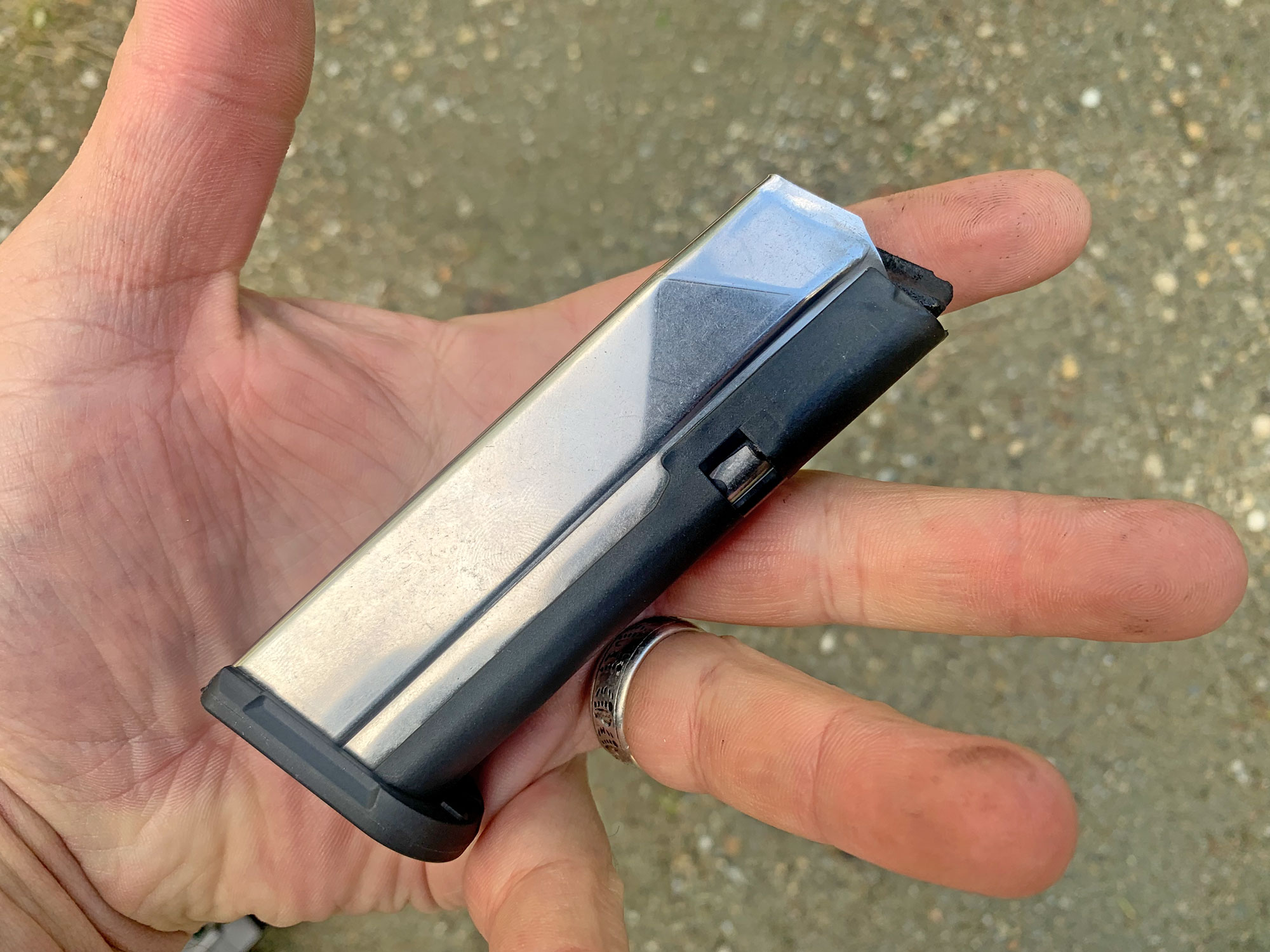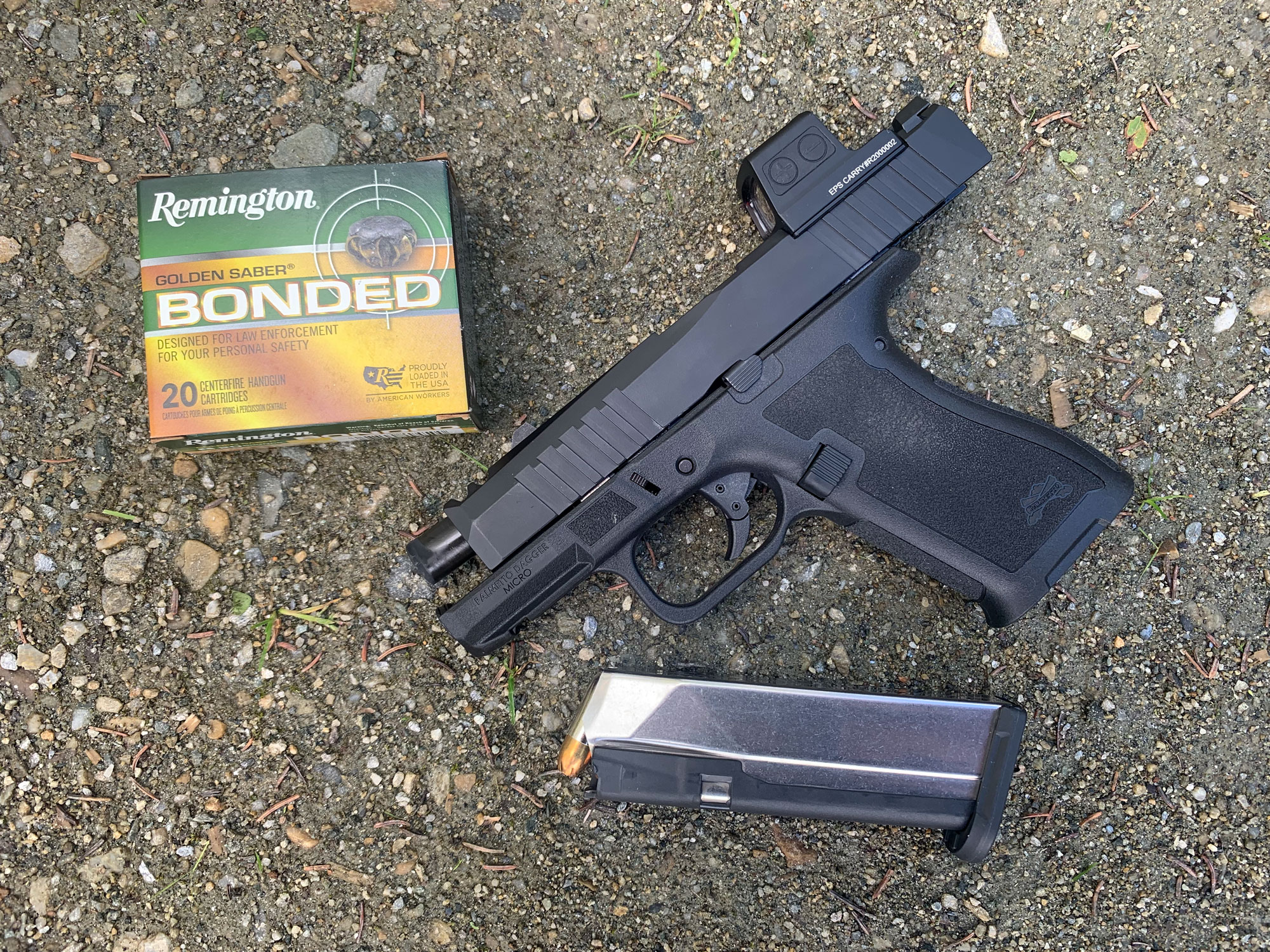We may earn revenue from the products available on this page and participate in affiliate programs. Learn More ›
Palmetto State Armory’s new PSA Micro Dagger is one of the latest in their lineup of affordable but feature-rich pistols. I was excited to test the C-1 model, which features an integral compensator, optic cut, and boasts a 15+1 capacity. Priced at $360, this could be one of the best values for a subcompact pistol — assuming it is able to hold up to rigorous use. Here’s what I found.
PSA MIcro Dagger C-1 Specs
- Caliber: 9mm
- Capacity: 15+1
- Action: Striker-fired
- Barrel: 3.41-inch barrel
- Dimensions: 7.25 inches (L) x 5 inches (H) x 1 inch (W)
- Weight: 21 ounces (with empty 15-round magazine and Holosun EPS Carry red dot) (weighed)
- Frame: Polymer
- Slide: Stainless, integral compensator
- Optics: Cut for optic, RMSc footprint
- Controls: Right-handed
- Finish: Black
- Grip: Polymer, stipple texture
- Sights: 3-dot white iron sights
- Trigger: Curved shoe, hinged safety trigger, 6 pounds 1 ounce (measured)
- Price: $360
Key Features
- Integral compensator built into slide
- RMSc optic footprint with cover plate and screws for optic
- No-snag iron sights
- Includes one 15-round steel/polymer magazine
- Accuracy: 1.642 inches (average of five five-shot groups from 15 yards)
Review Highlights
- Good ergonomics and slide profile
- Compensator helps reduce muzzle flip
- Good balance of features and price
- Great accuracy
- Only includes one magazine
PSA Micro Dagger: A Glock G43X Clone
Many companies make Glock clones, but usually they are more expensive than the original. Palmetto State Armory has a knack for producing models that are both more affordable and include some visual and ergonomic refinements that you won’t find on standard Glock pistols. The popular PSA Dagger is modeled after the Glock G19, but at a fraction of the price. Launched earlier this year, the PSA Micro Dagger is similarly crafted in the image of the the G43X MOS.
Takedown and parts are what you’ll find on a Glock G43X, including a 3.4-inch barrel and telescoping guide rod/recoil spring assembly. In fact, PSA Micro Dagger slide assemblies are compatible with G43, G43X, and G48 frames. They’re simple, reliable, striker-fired pistols that follow a proven design.

Where the PSA Micro Dagger Is Different Than A Glock
Though the PSA MIcro Dagger is clearly a Glock at its core, it sports some favorable deviations from the standard Glock protocol. The frame and slide both incorporate some thoughtful differences. This is a recipe that has worked well for many companies, recognizing that shooters want more refined slide profiles, ergonomics, and other features in addition to the Glock legendary reliability. What’s impressive is that PSA has managed to fold those into this pistol and still offer it for $150 cheaper than a standard Glock G43X.
PSA Micro Dagger Frame Assembly
The PSA Micro Dagger’s frame is simple and closely resembles the profile of the Gen 5 G43X frame. Glock has made improvements on this front, and eliminated the troublesome finger grooves that many shooters were Dremeling off anyway.
The PSA MIcro Dagger has a slightly humped grip with a nice beavertail and a simple stipple texture on the front, back, and sides of the grip, as well as on and above the trigger guard. This texture is a bit more comfortable and effective than Glock’s raised texturing, and it’s also perfectly suited for the DIY grip stippler. It features a single-slot accessory rail in front of the trigger guard to accommodate a light or laser.
LIke the full-sized Dagger, the PSA Micro Dagger uses a hinged safety trigger, but it feels quite similar to other striker-fired pistols. The trigger on my full-sized dagger was horrible, and I was able to improve it greatly with an aftermarket Lone Wolf trigger spring kit. The trigger on my sample PSA Micro Dagger was just fine, breaking at six pounds one ounce, and had a strong, tactile reset. I could shoot the pistol quite accurately, so there was no reason to mess with it.
PSA Micro Dagger C-1 Slide
A nice feature of the stainless steel PSA Micro Dagger slides is that they have thoughtfully beveled edges that look good and help reduce snagging. The top corners are machined away, and both the front and rear of the slides are beveled for smooth holstering and drawing. The slide comes standard with basic three-dot, white low-profile iron sights that are, frankly, better than factory Glock sights — which isn’t saying much. The rear sight fits in a dovetail and is adjustable for windage via a set screw.
The Micro Dagger comes with an optic cover plate, but is cut for an RMSc-pattern optic. I fit mine with a Holosun EPS Carry — a nice enclosed-emitter sight for concealed carry pistols. One thing to note, the PSA Micro Dagger comes with screws for both the cover plate and optic itself. It uses screws with larger diameter threads than many other slides, and most optics won’t come with them. Mounting is easy, and my optic sat low enough to barely co-witness the iron sights. Having your optic sit low will help if you’re concerned about your electronics failing but, more practically, it will help you acquire your red dot faster and shoot with better precision and speed.
Finally, the front of the PSA Micro Dagger C-1 slide features an integral recoil compensator. This model uses the same 3.4-inch barrel as other Micro Daggers, but the slide extends forward and features a two-slot blast chamber to redirect expanding muzzle gasses upwards — ultimately fighting against muzzle flip.

PSA Micro Dagger Magazine
A key departure from the standard Glock G43X is the hybrid steel/polymer 15-round magazine. The polymer Glock 43X magazine holds only 10 rounds. Sure, these larger-capacity mags are compatible with the Glocks, but it’s nice to see them come standard with the PSA Micro Dagger. There has been a dramatic increase in subcompact pistols that can hold as much (or more) ammunition than what we recently considered standard for compact or full-sized pistols. For a personal protection gun, the more ammunition you can be packing, the better.
The magazines function well, but you’ll want a mag loader to fill them up, they are a bit difficult to load. It’s also a bit of a negative that the PSA Micro Dagger only includes one magazine. You can order extras for $33, but I’d like to see them come with at least two — preferably three. The pistol comes in a nice carry case, but I’d rather have extra mags and receive it in a cardboard box.

PSA Micro Dagger Performance and Reliability
No news is good news when it comes to a potential concealed-carry gun’s reliability, and there really isn’t much to report for the PSA Micro Dagger. I fired more than 500 rounds through the pistol without a single legitimate malfunction. By intentionally holding the pistol with a very loose grip and limp wrist, I was able to create a few stoppages but, even then, it wasn’t easy to replicate. I fired both FMJ and JHP ammo through the Micro Dagger in 115-, 124-, 135-, and 147-grain options, and nothing had any trouble cycling.
When stuffed with 15 rounds, the magazine takes a substantial slap to seat it under a closed slide, and the pistol is a little stiff and clunky to chamber a round from a full magazine. Loading from an open slide didn’t present any issues.
Accuracy
Though the OL accuracy protocol for pistols isn’t as stringent as it is for hunting and precision rifles, we still want to give you a good idea of what to expect from you pistols and how this one might compare. I recorded five five-shot groups from 15 yards, from a standing position, using a sandbag on a tac table and tripod for support. Group sizes averaged just over 1.6 inches which is really good — especially for a budget-priced subcompact. For comparison, it performed virtually neck and neck with more expensive pistols like the Springfield Hellcat Pro Comp, and the heavier-duty Walther PDP-F 3.5-inch.
Though it isn’t as easy to blaze through plate racks with the Micro Dagger as it is with a tuned-up 2011, the ergonomics of the pistol and the compensatory make it easy to stay on target and shoot quickly and accurately. I had no problem keeping rounds on a two-thirds-size IPSC steel plate at 50 yards.

How Well Does the Compensator Work?
Compensators are a hot ticket item on concealed-carry pistols these days, and the logic is sound. A smaller, more compact pistol is going to produce more recoil and muzzle flip. We want to counteract that because being able to shoot your pistol accurately and manage recoil is paramount in a defensive situation. When considering a compensator, you need to decide if the reduced muzzle flip is worth the added length as well as the addition of potential debris-collecting cuts and recesses. The standard PSA Micro Dagger is almost an inch shorter and more comfortable to carry.
The compensator on the PSA Micro Dagger does seem to work pretty well, especially with spicier +P defensive loads. When you think about it, it makes sense that the extra pressure helps the compensator work more effectively than with lower-pressure ammo. The Micro Dagger’s compensator is pretty open-ended and doesn’t have any real significant edges to redirect gasses upwards — which is probably why it doesn’t seem to reduce recoil as much as some aftermarket comps and others like the Springfield design which integrates a blast chamber into the barrel itself. Still, It worked well with loads like Remington Golden Saber +P, and I think it’s worth having if you can carry it comfortably.
Final Thoughts on the PSA Micro Dagger C-1
Usually you get what you pay for, and that includes handguns. I won’t turn a blind eye to great value, however, and we know that’s something our readers, like you, appreciate. I have the good fortune of shooting many cases of 9mm ammo every year through a lot of different pistols and I would have no qualms about carrying the PSA Micro Dagger for defensive purposes. The PSA Micro Dagger is probably one of the best values in subcompact pistols on the market. I wish it came with a couple extra magazines, but that’s really my only gripe. For $360, it’s a steal.
